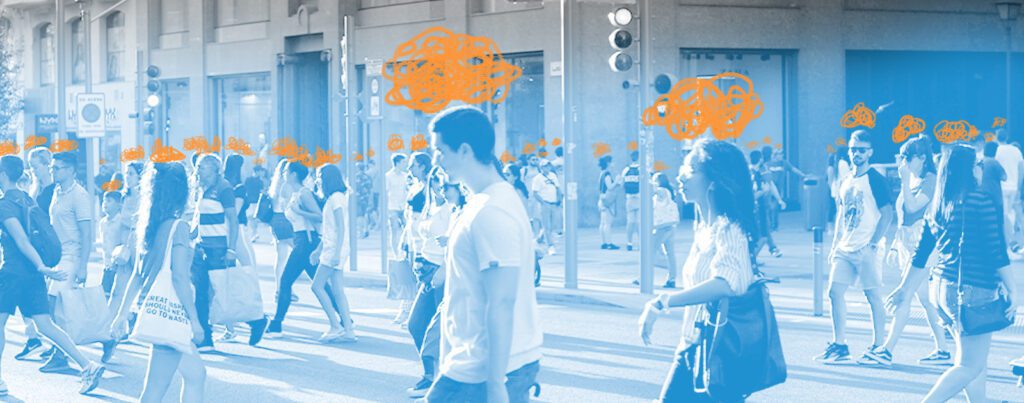By Christopher Reeves, MD
Think you might be struggling with COVID-19 fatigue? As the pandemic continues into its third year, you’re certainly not alone.
COVID-19 fatigue broadly refers to the lasting biological and psychological impacts of the coronavirus pandemic. More specifically, biological COVID-19 fatigue reflects the lasting physical exhaustion many people feel after recovering from the virus. Except in serious cases, these effects often resolve in two to three weeks.
But today, we’re going to talk about psychological COVID-19 fatigue. Some use the term to illustrate that they’re simply tired of or “over” the pandemic (aren’t we all?). But I want to address the more specific mental health challenges the pandemic has accelerated in many of us.
We’ve made necessary yet disruptive changes to our personal and professional lives to help slow the spread of coronavirus. Mask-wearing, social-distancing and on-and-off lockdowns – while effective – have forced us to step outside our comfort zones at home, in the office, at school and in social situations. Combine these inconveniences with a widespread sense of isolation, and the mental and emotional health consequences can stack up significantly.
If you find yourself mentally exhausted, on edge, downtrodden or even apathetic toward the ongoing pandemic, you might be battling psychological COVID-19 fatigue.
Over the years, I’ve watched many patients suffer emotionally and grow indifferent during long battles with cancer and other illnesses. I know it’s hard to keep going when you can’t quite see the light at the end of the tunnel. But I also know there are several practical, actionable steps you can take to care for your mental health during these uncertain times. Even a few seemingly small changes can accumulate to make a big impact on how you feel as the pandemic stretches on.
As Mental Health Awareness Month approaches, give these six practices a try to help carry you through COVID-19 fatigue.
1. Find someone to talk to.
Sometimes, the best thing you can do with your feelings is to just share them with someone who’ll listen.
Face-to-face communication has been challenging during the stay-at-home era, but even conversations over Zoom, FaceTime or Discord can be helpful. So if you have a family member or friend you can trust with sensitive discussions, ask them if they’d be willing to sit down and talk through what’s on your mind.
That said, anyone you bring your issues to is probably going through struggles of their own, pandemic-related or not. If you find that talking through your feelings is especially helpful, be careful not to shift too much emotional baggage onto any one person. Try to find multiple confidantes and discuss a different topic or two with each of them.
Not sure who to talk to, or whether you’re comfortable sharing sensitive information with friends and family? Consider a professional counselor. Along with helping you work through tough times, counseling can bolster your self-esteem, emotional management skills and ability to recognize negative thought patterns.
2. Eat well and exercise.
Working out and watching what you eat don’t just improve your physical health; they impact your mind, too.
As one of the best cures for mental exhaustion, exercise releases endorphins, which are hormones that naturally relieve pain and stress. Moderately intense aerobic activity, whether it’s a brisk walk around the block or some well-paced weightlifting, is one of the best endorphin-release methods out there. (Just don’t push yourself too hard. Get injured, and you’ll need to take a break from exercising, which means fewer endorphins!)
Healthy eating also carries significant, well-documented psychological benefits. Your body operates best when you fuel it with the best food, and your brain is your most important body part. Fill your meals and snacks with quality nutrients, and your brain will feel the positive effects. Conversely, foods with low nutritional value, like refined sugars, can cause brain damage and even worsen your mood.
3. Don’t skimp on sleep.
If you’ve been working mostly from home, you can easily to lose track of when to switch from “office mode” to “off-the-clock mode.” When you don’t allocate enough time to rest, unwind and, of course, sleep, you risk burning yourself out.
Sufficient sleep does more than just help the brain process emotional information in a healthy way. It bolsters learning and memory, which can lead us to better perform tasks at work, school and home. Lack of sleep, on the other hand, correlates closely to depression and other mental health afflictions. And, of course, few things feel worse than struggling to stay awake during a big meeting or lecture.
To prioritize sleep, set rigid boundaries for work hours or other mentally engaging tasks. Be disciplined about going to bed at a certain time (bedtimes aren’t just for kids) and give yourself some wind-down time. Avoid alcohol, tobacco and caffeine, and stay off electronics before lights-out.
4. Limit your screen time.
Many of us treat TV, video games and our phones like comfort food: momentary salves for our real-world stressors. But we can cause significant, long-term damage to our emotional and physical health if we spend too much time in front of a screen.
In addition to sleep benefits, limiting your screen time makes it easier to allocate time for exercise and outdoor activities. These, of course, have mental health benefits of their own and can help you maintain a healthy weight. Hitting the “off” button can encourage you to spend more time socializing, reading or learning a new skill – all of which foster a sense of accomplishment.
But most of us get our news electronically. While it’s important to stay informed, don’t become overwhelmed with doom-and-gloom headlines – especially during the pandemic. If you turn off the news notifications every now and again, you’ll have time to process your thoughts on current events without being inundated with new worrisome information.
5. Practice mindfulness.
Mindfulness generally refers to focusing on your present feelings, wants and needs in a calm, yet engaging manner. There’s no one right way to practice it, so take time to find the method that works for you. Here are a few to consider:
- Journaling can help you declutter your mind and deliberately work through tough times. When you keep track of how certain day-to-day experiences and interactions affect your thoughts and feelings, you can better anticipate negative emotional patterns down the road. And you can look back at earlier entries to see how your thought and behavior patterns change over time.
- Meditation, a practice that’s thousands of years old, helps many people manage anxiety, depression, sleep problems and other conditions that might relate to COVID-19 fatigue. Many forms of meditation exist, and there are several apps that can help guide first-timers.
- And for spiritual people (or those exploring spirituality), prayer is a type of meditation with emotional benefits of its own.
6. Invest in COVID-19 testing for peace of mind.
Uncertainty and lack of control are two of the biggest enemies of emotional well-being, which is what makes COVID-19 testing so important.
Two years into the pandemic, we’ve seen the case count spike at a moment’s notice several times and have no way of knowing when it will happen again. The current uptick in new COVID-19 cases further indicates how unsure we really are about the pandemic’s future. That makes it hard to go about day-to-day life – work, school, travel, large events – and feel completely secure. (Not to mention, the elimination of mask mandates on airplanes and in other venues can be extra-discomfiting for the super health conscious.)
Testing is our best means of protection against the virus and of making these everyday functions feel normal again. When you track of your health status, you feel in control. And it’s even better when you go to an event or venue where testing is required for everyone.
Care that helps you fight COVID-19 fatigue
Worksite Labs exists to help daily life feel safe again after two years of uncertainty and angst related to COVID-19. Whether you’re going abroad, seeing your favorite band perform, or just wanting to feel safe at work or in the classroom, we’re the testing resource you can trust.
Click here to book a test and stress a little less.
Christopher Reeves is Worksite Labs’ chief medical officer.





